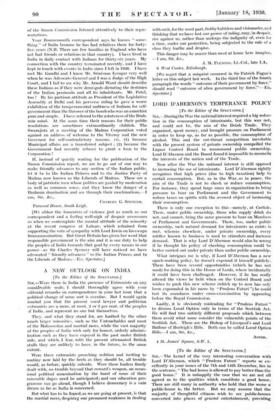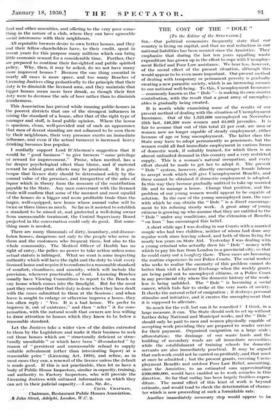[To the Editor of the SPECTATOR.] Sin,—The kernel of the
very interesting conversation with Lord D'Abernon, which " Prudens Futuri " reports so ex- cellently in your issues of the 7th and 14th December, lies in the sentence, " The bad house is allowed to pay better than the good house." It is unhappily the case that we are not all agreed as to the qualities which constitute a good house. There are still many in authority who hold that the worse a public-house is, the better. But we may assume that the majority of thoughtful citizens wish to see public-houses converted into places of general entertainment, providing
food and other amenities, and offering to the very poor some- thing in the nature of a club, where they can have agreeable social intercourse with their neighbours.
All reputable brewers desire to own better houses, and they and their fellow-shareholders have, to their credit, spent in recent years for this purpose many millions which can bring little economic reward for a considerable time. Further, they are prepared to continue their far-sighted and public spirited policy. Why, then, it may be asked, do we not have many more improved houses ? Because the, one thing essential in nearly all eases is more space, and too many Benches of Licensing Justices cling pedantically to the principle that their duty is to diminish the licensed area, and they maintain that bigger houses mean more beer drunk, as though their first duty were to decrease the sale of beer rather than to diminish drunkenness.
This Association has proved while running public-houses in the poorest districts that one of the strongest influences in raising the standard of a house, after that of the right type of manager and staff, is local public opinion. Where the house is spacious, clean, well-provided and of such an appearance that men of decent standing are not ashamed to be seen there by their neighbours, their very presence exerts an immediate influence, and even if the actual turnover is increased heavy drinking becomes less popular.
I cordially support Lord D'Abenion's suggestion that it would be " good business " to give brewers " some privilege or reward for improvement." Praise, when merited, has a far deeper psychological effect than blame, and if material reward be added great effects may be produced. It is gro- tesque that licence duty should be determined solely by the annual value of the premises, and irrespective of the sales of liquor which in theory form the measure of the contribution payable to the State. Any man conversant with the licensed trade will confirm that some of the meanest and most squalid of the houses do a bigger and more profitable trade than the larger, well-equipped, new house whose annual value will be twice or three times as much. So far as it assisted to establish a standard to be aimed at, and protected a well-doing owner from unreasonable treatment, the Central Supervisory Board projected in the conversation could only do good. But some- thing more is needed.
There are many thousands of dirty, insanitary, and disease- laden houses, dangerous not only to the people who serve in them and the customers who frequent them, but also to the whole community. The Medical Officer of Health has no right of entry, the police no power to take action unless some actual statute is infringed. What we want is some inspecting authority which will have the right and the duty to visit every licensed house and require it to conform to a reasonable standard of comfort, cleanliness, and amenity, which will include the provision, wherever practicable, of food. Licensing Benches usually have Viewing Committees to report to the Bench on any house which comes into the limelight. But for the most part they consider that their duty is done when they have dealt with the cases submitted to them at the Sessions ; and when leave is sought to enlarge or otherwise improve a house, they too often reply : " Yes. It is a bad house. We prefer to improve it, out of existence," and then " refer " it for com- pensation, with the natural result that owners are less willing to draw attention to houses which they know to be below a reasonable standard.
Let the Justices take a wider view of the duties entrusted to them by the Legislature and make it their business to seek out those houses which are " structurally deficient or struc- turally unsuitable " or which have been " ill-conducted " by reason of " persistent and unreasonable refusal to supply suitable refreshment (other than intoxicating liquor) at a reasonable price (Licensing Act, 1910), and refuse, as in most cases they can, a renewal of the licence unless the default is made good. If this is not practicable, then let us have a body of Public House Inspectors, similar in capacity, training, and authority to Factory Inspectors, who will provide the Licensing Justices with unbiased information on which they can act in their judicial capacity.—I. am, Sir, &c.,
CECIL CHAPMAN,
Chairman, Restaurant Public Houses Association. ,.5 John Street, Adelphi, London, W.C. 2.







































 Previous page
Previous page